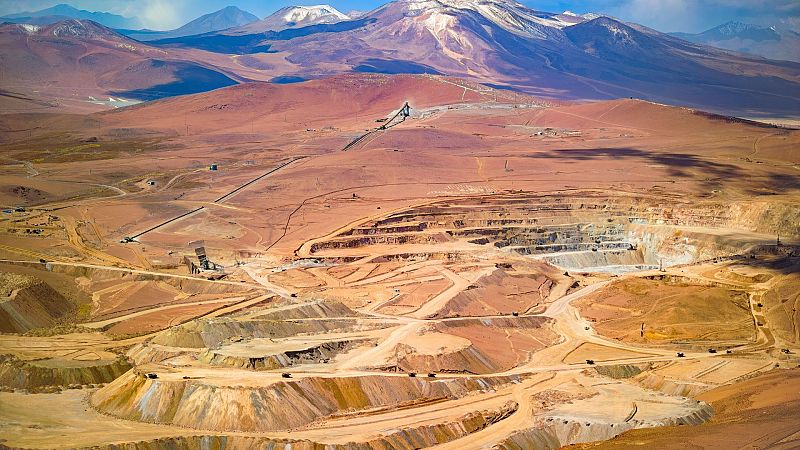Rio Tinto sees steady earnings despite lower iron ore prices

Mining giant Rio Tinto revealed a consolidated sales revenue of $53.7 billion (€51.5bn) for the full year 2024, a 1% fall from 2023. However, net earnings came up to $11.6bn (€11.1bn) in 2024, representing a rise of 15% from the previous year.
This was despite an 11% drop in iron ore prices, mainly because of weaker demand from China, as its domestic property sector still faces major issues.
Rio Tinto's share price dropped 1.5% on Thursday morning.
Underlying earnings before interest, taxes, depreciation and amortisation (EBITDA) came up to $23.3bn (€22.3bn) for 2024, a drop of 2% from 2023.
Underlying EBITDA for iron ore came up to $16.2bn (€15.5bn), with the Pilbara iron ore production being 328 million tonnes. Underlying EBITDA for aluminium was $3.7bn (€3.5bn), whereas for copper, it was $3.4bn (€3.3bn) and for minerals, $1.1bn (€1.1bn).
In 2024, Rio Tinto made significant strides at Oyu Tolgoi in Mongolia, with construction also starting for the expansion of the AP Technology AP60 aluminium smelter in Quebec. Argentina's Rincon starter plant also produced its first lithium.
In a statement, Jakob Stausholm, the chief executive officer (CEO) of Rio Tinto said: "We continue to build on our momentum with another set of strong operational and financial results. Our strong balance sheet enables us to pay a $6.5 billion (€6.2bn) ordinary dividend, maintaining our practice of a 60% payout, the ninth consecutive year at the top end of our payout range, as we continue to invest with discipline.
Optimism for the future at world's second largest miner
"We are excited as we head into 2025, with all the building blocks for an incredibly successful, diversified and growing business in place including the expected closing of the Arcadium acquisition in March. We will remain disciplined in the short, medium and long term, while paying attractive returns to shareholders."
Rio Tinto's chair Dominic Barton said in the company's 2024 annual report: "Rio Tinto is optimistic about the coming year. In 2024, we laid out the pathway to a decade of growth, gained clarity on the portfolio, and ensured we are in excellent financial health even as we execute more projects worldwide than ever before.
"Even with more global volatility, the underlying drivers of population growth, an expanding global middle class, the push for more localised manufacturing, artificial intelligence, and the energy transition continue to underpin demand for what we do."
Analysts say results illustrate the company's resilience
Commenting on the results, Maurizio Carulli, energy and materials analyst at Quilter Cheviot, said: "Rio Tinto's FY2024 results are broadly in line with expectations, and the company has provided a steady outlook for the future. It is reassuring to see that group earnings (EBITDA) decreased by only 2% despite an 8% fall in iron ore prices. This resilience is a positive consequence of the evolution in the earnings mix and Rio Tinto's defensive characteristics.
"Net debt has increased to $5.5bn (€5.3bn) due to acquisitions carried out in 2024, but it remains at comfortable levels. Looking ahead, Rio Tinto is guiding for a 4% volume growth in 2025. Management has indicated that its two largest mining projects, Simandu (iron ore) and Oyu Tolgoi (underground copper), are progressing well. Additionally, the acquisition of lithium producer Arcadium is expected to be completed next month.
"Rio Tinto boasts a solid portfolio of assets, primarily positioned at the lower end of the cost curve in iron ore, copper, aluminium, and, since October, lithium. The significant barriers to entry in iron ore and copper, due to the complexity and difficulty of developing new mines, further strengthen Rio Tinto's market position."
Shareholders asked to oppose abandoning London listing
Rio Tinto has been increasingly under pressure from activist investor Palliser Capital and several other shareholders to review its dual-listing model. The company is being pushed to keep only its Australia listing, instead of one in London as well, in an effort to boost its share price.
However, the company's board has urged shareholders to oppose this proposal, saying in the 2025 notice of annual general meeting: "The Board considers that the resolution is not in the best interests of Rio Tinto as a whole and has recommended that shareholders of Rio Tinto plc vote against the resolution."
This is mainly because of concerns of such a move being too expensive. Recently, other mining companies such as Glencore have also been reviewing their London listings, with BHP also moving its primary listing to Australia.
Today

